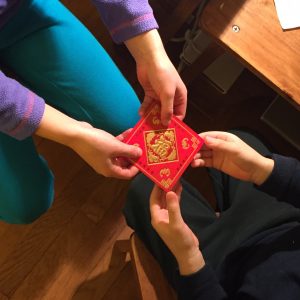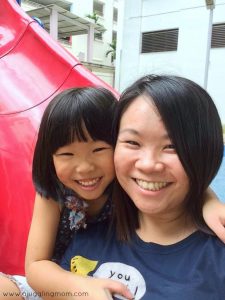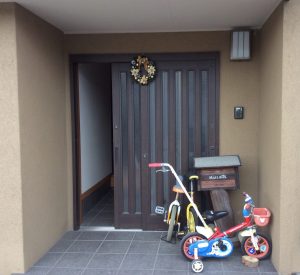
by Kyla P'an (Portugal) | Feb 19, 2015 | 2015, Awareness, Being Thankful, Celebrations, Childhood, China, Culture, Education, Eye on Culture, Family, Husband, International, Kids, Life, Life Lesson, Marriage, Motherhood, Multicultural, Parenting, Relationships, Traditions, USA, World Events, World Motherhood, Younger Children
 Solar year, 2015—celebrated in most of the Western world— is small potatoes compared to its lunar counterpart starting today: The Year of the Goat, 4713.
Solar year, 2015—celebrated in most of the Western world— is small potatoes compared to its lunar counterpart starting today: The Year of the Goat, 4713.
Today, in many countries across Asia, people are celebrating Chinese New Year [CNY]. It marks the first day of the lunar year, which begins with the second new moon after the Winter Solstice.
CNY is the most important holiday for Chinese people world-wide and is celebrated in countries with significant Chinese populations (Hong Kong, Macau, Singapore, Taiwan, Indonesia, Philippines, Thailand, Malaysia and Mauritius).
Even right here in America, in ways both big and small, Chinese families are celebrating the Year of the Goat too.
My husband, a first generation Chinese-American, brought his Chinese culture into our home and together we have established our own family traditions.
Both our 8 and 5 year old children attend Chinese Language School so our celebrations typically begin there. This year, each of our kids performed in a class skit—one doing a New Year’s song and the other both a song and dance.
Their Chinese school rents out a local auditorium and the celebration goes on for four hours, complete with traditional paper decorations, red lanterns and Chinese snacks of spring rolls, scallion pancakes and fortune cookies (the latter of which I’m pretty sure is a wholly American invention).
And though the four-hour Chinese school celebration feels long and drawn out, it’s nothing compared to the 15-day celebration going on over in Asia.
We live just outside of Boston, a city boasting a large Chinatown. If we’re really motivated, we can fight the crowds and view Lion Dancers, firecrackers in the street and dine on authentic Chinese fare surrounded by thousands of people.
This year, however, our city is buried under record amounts of snow (96.7in/2.5m) so we won’t be making any such pilgrimage.
Sometimes we have friends over and make homemade wontons, a symbolic food representing a pouch of coins, or Hot Pot. Other years we just make sure we eat some kind of Chinese food (either at home or in a restaurant).
We also make sure we always give our kids Hong Bao, little, red envelopes filled with “lucky” money. Since our kids don’t get an allowance, this feels special to them. We never give them very much because it’s the gesture that counts but if they happen to be lucky enough to visit their great-grandmother around Chinese New Year, they might get upwards of $50.
I know these little traditions are modest compared to mainland China but we hope that in our small way we are instilling in our children a some sense of the deep culture they are part of.
恭禧發財
Gong Xi Fa Cai!
How do you hold on to your cultural heritage? What are some traditions you’ve incorporated into your own family?
This is an original post to World Moms Blog from our managing editor and mother of two in Boston, Massachusetts, Kyla P’an.
The image used in this post was taken by the author.
Kyla was born in suburban Philadelphia but spent most of her time growing up in New England. She took her first big, solo-trip at age 14, when she traveled to visit a friend on a small Greek island. Since then, travels have included: three months on the European rails, three years studying and working in Japan, and nine months taking the slow route back from Japan to the US when she was done. In addition to her work as Managing Editor of World Moms Network, Kyla is a freelance writer, copy editor, recovering triathlete and occasional blogger. Until recently, she and her husband resided outside of Boston, Massachusetts, where they were raising two spunky kids, two frisky cats, a snail, a fish and a snake. They now live outside of Lisbon, Portugal with two spunky teens and three frisky cats. You can read more about Kyla’s outlook on the world and parenting on her personal blogs, Growing Muses And Muses Where We Go
More Posts - Website
Follow Me:


by ThinkSayBe | Feb 13, 2015 | 2015, Awareness, Communication, Cultural Differences, Education, Human Rights, Humanity, Parenting, Prejudice, Social Equality, ThinkSayBe, World Motherhood

Racism |ˈrāˌsizəm|noun: The belief that all members of each race possess characteristics or abilities specific to that race, esp. so as to distinguish it as inferior or superior to another race or races.
Prejudice |ˈprejədəs|noun: Preconceived opinion that is not based on reason or actual experience: English prejudice against foreigners | anti-Jewish prejudices.• dislike, hostility, or unjust behavior deriving from unfounded opinions.
These are the definitions of these two words as provided by the dictionary on my Macintosh device. Has everyone experienced racism and prejudices by either acting or feeling these words out, or by being victims of them? For those of us who have been prejudiced against a person or people. and have been racist against others: have we been honest with ourselves about it?
(more…)
I am a mom amongst some other titles life has fortunately given me. I love photography & the reward of someone being really happy about a photo I took of her/him. I work, I study, I try to pay attention to life. I like writing. I don't understand many things...especially why humans treat each other & other living & inanimate things so vilely sometimes. I like to be an idealist, but when most fails, I do my best to not be a pessimist: Life itself is entirely too beautiful, amazing & inspiring to forget that it is!
More Posts
Follow Me:


by Susan Koh | Feb 5, 2015 | 2015, Awareness, Caring, Childhood, Inspirational, Life Balance, Motherhood, Parenting, Responsibility, Singapore, Susan Koh, Working Mother, World Motherhood, Younger Children
 Since the start of the year, my daughter, Sophie, has been asking me to play with her as soon as we get home from work. I think it has to do with her anxiety about entering primary one in a year’s time (the age where formal studies start in Singapore). The teachers in her childcare have been telling her that she’ll have no time to play because she’ll have homework from school.
Since the start of the year, my daughter, Sophie, has been asking me to play with her as soon as we get home from work. I think it has to do with her anxiety about entering primary one in a year’s time (the age where formal studies start in Singapore). The teachers in her childcare have been telling her that she’ll have no time to play because she’ll have homework from school.
Some days, I’m glad to put down everything and play with her. But on other days, I’ll tell her to play on her own so that I can get down to the household chores. And on one of those days, when I was tired and frustrated after a full-day’s work, I lashed out at her for not being able to play independently when I have a hundred-and-one chores to see to, only to have her respond in tears.
When I questioned why she was so upset, she told me in between sobs that all children like to play and she really would like mummy to play with her.
A missed opportunity to play with your child, is a missed opportunity to enter their world and bond with them.
I can sense that my daughter’s request to play with her is really her way of saying:
“I want to spend time with you mummy”
“I want to do things with you daddy”
“I want you to be beside me”
While I may have my own agenda of what bonding with my daughter means, taking her to the playground, playing Lego, doing craft work, cooking pancakes together, her request is simply to put down what I’m doing and play with her.
And how can I allow her childhood to slip by without being a part of it? After all, we may not always have these moments:
- when our child still wants to play hide and seek with us
- our child asks for yet another bedtime story
- they hug us with all their might to show that they really really really love us
- they tickle us with the silliest things they say and infect us with their contagious laughter till our belly aches
- their little hands reach for ours looking for security in the middle of the night
- they plant a kiss on our cheeks and whisper, I love you mummy, for no reason at all; which melts us over and over again
The next time your child asks you to put down what you’re busy with so you can come play with her, don’t turn her down. A missed opportunity to play with your child, is a chance missed to enter her world and create special memories together.
What are some of the ways you take time out of your schedule to spend quality time playing with your child?
This is an original post to World Moms Blog from our contributor in Singapore, Susan Koh.
The images used in this post are attributed to the author.
Susan is from Singapore. As a full-time working mom, she's still learning to perfect the art of juggling between career and family while leading a happy and fulfilled life. She can't get by a day without coffee and swears she's no bimbo even though she likes pink and Hello Kitty. She's loves to travel and blogs passionately about parenting, marriage and relationship and leading a healthy life at A Juggling Mom.
More Posts

by Nadege Nicoll | Jan 15, 2015 | 2015, Awareness, Communication, Cultural Differences, Family, France, Girls, Global Citizenship, Humanity, International, Loss of Child, Motherhood, Nadege Nicoll, News, Older Children, Parenting, Terrorism, World Events, World Motherhood, Younger Children

A year ago, girls, teenagers who wanted an education so they could look forward to a great future, were abducted from their school in Chibok, Nigeria. They were taken away, kidnapped and removed from their family, because they were guilty of having ambitions. All these girls had to defend themselves were books.
What’s left of this horror is parents. Mothers and fathers, grieving for a loss that can never be overcome, hurting from a pain that will never lessen, left to wonder why, and knowing that no answer will ever alleviate their sorrow. Because there is no justification.
A few months ago, Peshawar happened and with it, the world once again, lost its innocence. Over 150 kids massacred, because they were guilty of being the children of their parents. All these kids had to defend themselves were notepads.
What’s left of this horror is parents. Mothers and fathers, grieving for a loss that can never be overcome, hurting from a pain that will never lessen, left to wonder why, and knowing that no answer will alleviate their sorrow. Because there is no justification.
Last week, my home country, France, was the theatre of repeated terrorist attacks. People were massacred because they went to work that day, or decided to do their grocery shopping. A brutal attack, with one side holding weapons, the other pencils.
And the violence continued with news of over 2000 killed in Baga, Nigeria.
What’s left of this horror is parents. Mothers, fathers, grieving for a loss that can never be overcome, hurting from a pain that will never lessen, left to wonder why, and knowing that no answer will ever alleviate their sorrow. Because there is no justification.
Mothers, fathers of this world, our families are being hurt beyond comprehension. Pencils are fighting bombs, words are matched with weapons. These violent attacks are not about gender, race, religion, background, or opinions. They are about pulverizing families. This is a call to unite. We all have a responsibility to do everything in our power to preserve our families and help others do the same.
We are all Chibok girls. We are all Peshawar. We are all Charlie.
How do we, global parents everywhere, teach our children to cherish and preserve their families? How do we unite to show them that violence is never the answer?
This is an original post to World Moms Blog by Nadege Nicoll. She was born in France but now lives permanently in New Jersey with her family. Nadege also writes a daily blog for moms who need to smile at everyday life. She can be found on Twitter, Facebook and her website www.nadegenicoll.com.
Image creation by author.
Nadege Nicoll was born in France but now lives permanently in New Jersey with her family. She stopped working in the corporate world to raise her three children and multiple pets, thus secretly gathering material for her books. She writes humorous fictions for kids aged 8 to 12. She published her first chapter book, “Living with Grown-Ups: Raising Parents” in March 2013. Her second volume in the series just came out in October 2013. “Living with Grown-Ups: Duties and Responsibilities” Both books take an amusing look at parents’ inconsistent behaviors, seen from the perspective of kids. Nadege hopes that with her work, children will embrace reading and adults will re-discover the children side of parenthood. Nadege has a few more volumes ready to print, so watch this space…
More Posts - Website
Follow Me:



by Melanie Oda (Japan) | Jan 8, 2015 | 2014, Awareness, Child Care, Childhood, Culture, Domesticity, Education, Expat Life, Eye on Culture, Family, Feminism, Grandparent, Home, Husband, International, Japan, Life, Life Lesson, Living Abroad, Marriage, Me-Time, Motherhood, Multicultural, Parent Care, Parenting, Priorities, Relationships, Responsibility, School, Social Equality, Womanhood, Women's Rights, World Motherhood, Younger Children
 Gender equality has been in the news quite a bit in Japan recently, sort of, and some things have happened closer to home that have me thinking.
Gender equality has been in the news quite a bit in Japan recently, sort of, and some things have happened closer to home that have me thinking.
It started when a (female) Tokyo assembly member was heckled in a sexist way. Then Prime Minister Abe introduced some new policies to let women “shine.” (He needs to get them doing something for the economy.) He even appointed several women to cabinet posts, for about five minutes, until they were slapped back down into their places over minor scandals.
In Japan, people are talking more about issues women face but no one seems to be doing much about them.
(Lest I forget: strangely enough, the declining birth rate is treated as a “women’s issue.” I seem to remember my husband being involved, too.)
I never considered myself a feminist growing up. Some members of the evangelical, conservative community I grew up in doubtless felt “feminist” was a new version of the “F-word.”
OK, so I went to a high school with more sports options for boys than girls. And yes, girls were encouraged to take chorus and home economics instead of woodworking or mechanics. So maybe I heard men from my community refer to grown women as “broads” or “gals.” There also were some restrictions at church regarding women’s and men’s roles. But I never felt that possessing certain types of baby-making parts limited my potential.
Then I moved to Japan, where gender roles are more firmly entrenched and my way of thinking slowly changed.
As I get older, and because I am a mother, I find that I am limited in ways that I couldn’t have foreseen as a young girl.
Some people may find life here in Japan freeing. If you aspire to be a homemaker a la Martha Stewart, then your life’s work would be very much respected and appreciated here. My husband wouldn’t bat an eyelid if he came home to a messy house because I’d spent the day at a preschool mothers’ lunch. He knows that is part of the job (on the other hand, it would never occur to him to pick up the mess himself.)
If, as a woman, you have other aspirations, Japanese culture seems designed to work against you. The glass ceiling is very much in tact. On the news here you do hear issues like lack of childcare and “maternity harassment” being addressed. But what gets talked about less often is that to many women, including myself, it feels as if there’s a glass door as well.
It’s my front door.
Before a woman can even think about what is facing her out in the world, she needs to address the forces that are keeping her at home. Some of these are practical, some are logistical, some are cultural and perhaps peculiar to Japan and it’s work culture.
For me, it starts with my husband: He leaves home at 7am every morning, but I have no idea what time he will be back. Sometimes it’s 7pm. Sometimes it’s midnight. He may be in the office that day, or he may suddenly be sent to another prefecture. He’s made international trips on 12 hours notice. I cannot depend on him being home at a designated time, by no fault of his own. The idea of him taking time off with a sick child is preposterous in the extreme.
I have been lucky enough to have two job offers recently, both of which would be more or less during school hours, but neither is nearby. If a child were to get sick and need picking up, or if god-forbid there was a natural disaster (which is always in the back of your mind if you are a mother in Japan,) then my husband would be closer. I mentioned that, and he completely shot me down. Not just the idea of him picking up the kids in case of an emergency, but the idea of a job anywhere outside of cycling distance from the school.
We live in a residential neighborhood. I patch together some part-time work here and there, but it’s not like there are loads of professional opportunities in a two kilometer radius.
I suddenly felt very limited, penned in, in a way I haven’t felt before. The glass door was slamming in my face.
I don’t think I’m alone in this conundrum. Go to almost any supermarket in a residential area during the day, and you will see women in their prime working years manning the register. Many of these women have university degrees. Many have licenses and qualifications to be doing other kinds of work, but they want to stay close to home. They also need salaries to stay under $10,000 year or face a peculiar Japanese tax code and insurance system that penalizes families where both partners have incomes over that amount.
Then there are my kids: Like 2/3 of Japanese women with children under 6, I stayed home when they were small. They now completely depend on me for everything. It seems to have never entered their minds that someone else could give them a bath or help them find their missing socks, mostly because no one else has ever done anything for them. Especially when they are sick, they want only me. It was very hard when my daughter was in the hospital, both children wanting to be with me and emphatic that no one else would do.
But now my youngest is in elementary school, and I would like to just be doing more of something….else, but for me to plunge into the workforce would be a huge adjustment for my children. Is it worth the stress? Can we survive what is sure to be a painful adjustment period?
Maybe if I had more family support, it would feel less impossible but as it is, it seems like everyone is against me.
Which brings me to the final characters in this comedy, my in-laws: They say they’ll watch the kids, then they change their minds. Or something better comes up. From their point of view, this house and these people are completely my responsibility. Anything they do is extra credit.
To be honest, we’re getting to the point where my in-laws need my help more than I need theirs.
They aren’t shy about letting me know my place.
One day not too long ago, my son was playing at the park with his friends. It was getting close to homework time, so I called him and told him to come home. He said he was playing with Jiji (which is an endearing term for grandfather used in our region of Japan,) and could he play for a bit longer? Since he was out with an adult, I said okay.
The next day, I got a verbal whipping from my father-in-law over the phone, accusing me of being irresponsible, a bad mother. It took me a few minutes to understand why he was saying this, but when I got to the bottom of it, I realized my son had lied to me. He was playing with his friends when Jiji walked by and told him to go home. My son told him I wasn’t at home and said he couldn’t come back until I did. (I must have called right at this point.) “How dare you not be home in the afternoon?” said Jiji.
Putting aside that none of this nonsense was true, so what if I wasn’t home in the afternoon? Of course I wouldn’t have left the kids to wander the neighborhood like stray dogs, but why was my not physically being inside my house such an issue to him? His assumption that it was my duty to be always available to everyone took me by surprise.
I could almost hear the glass door slamming again.
There are also other barriers for women in Japan—an over active PTA for one, and a myriad of community responsibilities attended to exclusively by women for another. I imagine most women in the world encounter both the “glass door” and the “glass ceiling” in some form or another, but in Japan only one of these factors is seems to be getting much attention. Building new daycare facilities isn’t enough; the government stating goals to increase women’s participation in the workforce isn’t enough. Until we do something about that glass door, nothing will change for one of the best educated, least utilized group of women in the world.
Do you feel you are fulfilling your potential, both at work and at home? What’s the situation like in your country?
This is an original post for World Moms Blog from our writer and mother of two in Japan, Melanie Oda.
If you ask Melanie Oda where she is from, she will answer "Georgia." (Unless you ask her in Japanese. Then she will say "America.") It sounds nice, and it's a one-word answer, which is what most people expect. The truth is more complex. She moved around several small towns in the south growing up. Such is life when your father is a Southern Baptist preacher of the hellfire and brimstone variety.
She came to Japan in 2000 as an assistant language teacher, and has never managed to leave. She currently resides in Yokohama, on the outskirts of Tokyo (but please don't tell anyone she described it that way! Citizens of Yokohama have a lot of pride). No one is more surprised to find her here, married to a Japanese man and with two bilingual children (aged four and seven), than herself. And possibly her mother.
You can read more about her misadventures in Asia on her blog, HamakkoMommy.
More Posts
by Nihad | Jan 7, 2015 | 2014, Awareness, Education, Egypt, Family, Life, Relationships, Womanhood, Women's Rights, World Moms Blog, World Motherhood
 Happy New Year! In this season of resolutions, many of us are looking for ways to live a happier life. As a mother, I believe increasing one’s happiness is a wonderful thing to do for oneself and for one’s family–an angry, bitter and unhappy woman can never make her family happy. But how do we find our way to a happier life?
Happy New Year! In this season of resolutions, many of us are looking for ways to live a happier life. As a mother, I believe increasing one’s happiness is a wonderful thing to do for oneself and for one’s family–an angry, bitter and unhappy woman can never make her family happy. But how do we find our way to a happier life?
Happiness is all about us, about our mindset, what we believe and how we feel. Our circumstances, our possessions, our job and our bank account are just temporary sources of happiness. Real happiness shines from the inside out, reflecting how we feel about ourselves and how satisfied we are with who we are and how we live. As a life coach, here are 10 practices I’ve found that enhance my daily happiness.
1- Improve your self image: For me, the first and most important source of happiness is how I feel about the image I see in the mirror. How proud do I feel about myself? What kind of relationship do I have with myself? Do I offer myself love, respect, acceptance and appreciation? Or is it guilt, shame, anger, and low self esteem? Being happy with who I am is my main source of happiness.
2- Don’t seek approval of others: Many women live in a way they don’t want just to please their partner, their family, or their friends. Though this may result in short-term approval and acceptance, living according to others’ expectations will not create lasting happiness.
3- Keep your word to yourself: Learn to say NO to what is not a priority in your life. If you set a ME time for yourself ,do not give it up easily. Keeping your word to yourself will greatly enhance your feeling of self worth and self respect.
4- Eat healthy food and exercise: Healthy food will positively impact your mood and give you more energy. Working out regularly has a great effect on physical and mental health. According to a psychiatrist friend of mine, walking one hour in open air equates the effect of an antidepressant pill. So when you feel down, try going for a walk outside.
5- Let go: Let’s face it. There are some aspects of our lives we cannot control. We certainly can’t control, or change, the past. Accepting the reality that we can do nothing brings a great relief and freedom.
6- Find your passion: Working on something you love brings real satisfaction. If you haven’t yet found your passion, play around with different hobbies like making or listening to music, drawing, or writing. Expressing your thoughts and feelings in any way will help you get clear about what your passion is.
7- Keep only fulfilling relationships: Continuing with unhealthy and non-fulfilling relationships is an energy drain. See no. 3.
8- Keep a gratitude journal: Make it a habit to jot down 5 things in your life for which you are grateful. If have something you complain about all the time, follow your complaint with any positive you can find in it. Eventually, you may find a blessing in what you were complaining about.
9- LOL: Find a reason every day to laugh, and spend time with your beloved ones having fun and laughing out loud.
10- Spend some time away from media and technology: Take a brief holiday from the TV, radio, internet, even your iPhone. Spend the time working out, meeting friends, reading books, playing with your kids and pets, or taking a walk. Observe how you feel. Just few days (or even an afternoon) without media and technology will make great difference in your life and your satisfaction.
These are my tips on how to live a happier life. What are some things you do to add happiness to your life? What is your definition of happiness and do you find it easy to live according to this definition? What challenges do you face to live a happier life?
This is an original post for World Moms Blog by Nihad from Alexandria, Egypt. Nihad blogs at Aurora Beams Life Coaching.
Image courtesy of “Pretty Girl In A Hat At Sunset” by Stuart Miles, FreeDigitalPhotos.net

Nihad is an Egyptian woman, who was born and has lived her whole life in Alexandria, Egypt. She says, “People who visited this city know how charming and beautiful this city is. Although I love every city in Egypt, Alexandria is the one I love the most.”
She is a software engineer and has worked in the field for more than twenty years. But recently she quit her job, got a coaching certificate and she is now a self employed life and career coach. She says, “I believe that women in this era face big challenges and they are taking huge responsibilities. That's why I have chosen my niche -- women looking for happiness and satisfaction. I help and support them in making whatever change (career change, life change, behavior change, belief change…) they want to bring more satisfaction and happiness in their lives.”
Nihad is a mother of two lovely boys, 15 and 9 years old. She states, “They are the most precious gifts I have ever had. I madly love them, and I consider them the main source of happiness in my life.”
Our inspiring mother in Egypt can also be found at Aurora Beams Life Coaching.
More Posts

 Solar year, 2015—celebrated in most of the Western world— is small potatoes compared to its lunar counterpart starting today: The Year of the Goat, 4713.
Solar year, 2015—celebrated in most of the Western world— is small potatoes compared to its lunar counterpart starting today: The Year of the Goat, 4713.















